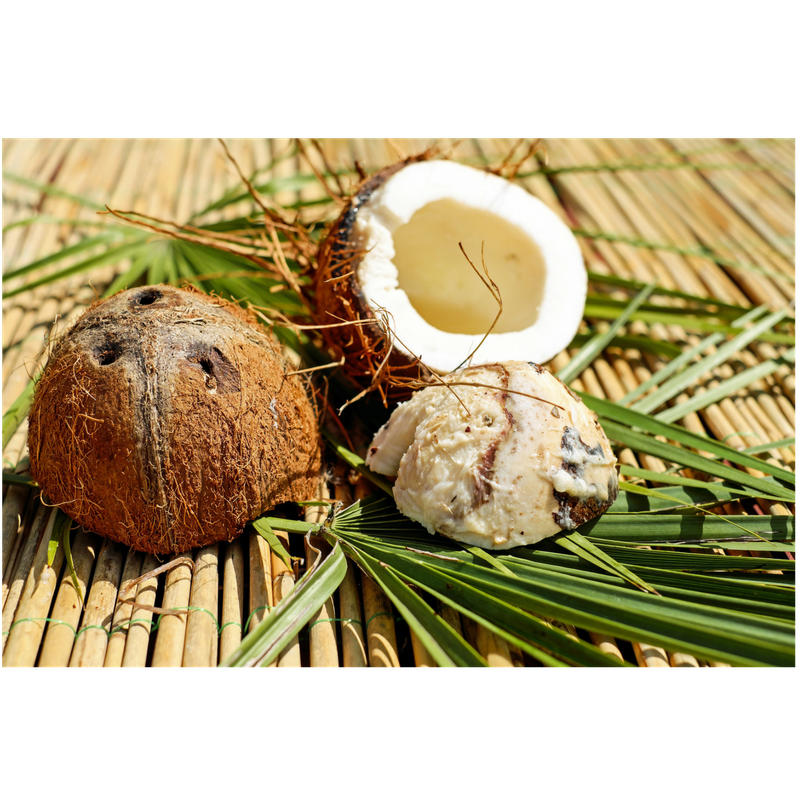Yes you should (end of post).
First of all, let’s just get this out of the way. You may have heard in the past few months that the American Medical Association came out with a research study that said that coconut oil is bad for you.
I went to The University of the Sciences in Philadelphia (then Philadelphia College of Pharmacy & Science) for my undergraduate degree. I had to take many classes that involved scientific research, learning how to anazlyze studies in medical journals to tell if they are valid or not.
Just because a study has been published in a medical journal does not mean that it is valid. There are many studies published that have little to no accuracy because they are skewed to produce a certain result for an outcome that is favorable to the institutions behind the study. Many studies are even by ghost writers.
One of the first things to look for when trying to determine how valid a published scientific study is is by looking at who funded the study. Pharmaceutical companies Pfizer, Glaxo-Smith Kline, AstraZeneca, Amgen and many more are listed as providing research grants for the authors who published the study about coconut oil.
The same pharmaceutical companies manufacture cholesterol-lowering medications, like statins. Pharmaceutical companies are set out to discredit anything that will effect their bottom line. They want everyone to rely on their drugs so that they keep racking up the profits. Unfortunately, much of the information they put out is inaccurate when analyzed from a scientific perspective.
If individuals are looking to improve their diets or utilize alternative therapies, they will be less likely to use the products that pharmaceutical companies sell.
The media will readily put out this false information because 1) they are not scientists that can break down a research study and find inaccuracies, and 2) the pharmaceutical companies pay for advertising. When you pay for advertising, you can have whatever you want put out into the media.
Getting back to coconut oil..
What exactly is it about coconut oil that makes it so healthy? And which type is best?
Let’s dive into some of the fascinating research and find out.
Coconut oil is a special kind of fat
Coconut oil is fat and contains the same 9 calories per gram as other fats.
It is extracted from the “meat” of the coconut. Coconut oil is a white solid at room temperature and easily melts into a clear liquid on a hot day.
The idea of adding coconut oil to your diet is NOT to add on to what you already eat but to substitute it for some of the (possibly) less healthy fats you may be eating now.
And here’s why – Because not all calories or fats are created equal.
Coconut oil contains a unique type of fat known as “Medium Chain Triglycerides” (MCTs). In fact, 65% of the fat in coconut oil are these MCTs.
What makes MCTs unique is how your body metabolizes them; they’re easily absorbed into the bloodstream by your gut, where they go straight to the liver, and they’re burned for fuel or converted into “ketones.”
This metabolic process, unique to MCTs, is what sets coconut oil apart from other fats.
Coconut oil MCTs may help with fat loss
Coconut oil’s MCTs have been shown to have a few different fat loss benefits.
First, it can help to increase feelings of fullness, which can lead to a natural reduction in the amount of food you eat.
Second, because of their unique metabolic route, MCTs can also increase the number of calories you burn; this happens when you compare the calories burned after eating the same amount of other fats.
In fact, a few studies show that coconut oil may increase the number of calories you burn by as much as 5%.
Third, some studies show that eating coconut oil can help reduce belly fat (a.k.a. “waist circumference”).
Just remember not to add coconut oil to your diet without reducing other fats and oils!
How much coconut oil should I eat?
Many of the studies that showed increased fullness, increased metabolism, and reduced belly fat only used about 2 tablespoons per day.
You probably don’t need any more than that.
What kind of coconut oil is the best?
There are so many coconut oil options available in grocery stores these days that it can make it difficult to know which is best.
I recommend you stay away from “refined” ones, and opt for organic “virgin” coconut oil. That is because it is processed at lower temperatures and avoids some of the chemical solvents used in the refining process; this helps to preserve more of the oil’s natural health-promoting antioxidants. Using organic coconut oil will, also, make sure that you are not getting toxins in the oil.
Pro Tip: Always (and I mean ALWAYS) avoid “hydrogenated” coconut oil. It can be a health nightmare because it contains the infamous “trans fats.”
One thing you should also consider is that each oil has a specific high temperature that you should avoid surpassing (e.g. its “smoke point”). For virgin coconut oil, that temperature is 350F. That means you can safely use it on the stovetop on a low-medium setting, as well as in most baking.
Conclusion:
Substitute some of the fat you eat with virgin coconut oil; this may help you to lose weight and belly fat by naturally helping you to eat less, as well as slightly increasing your metabolism. I use coconut oil in place of using olive oil most of the time. It gives everything a great flavor, especially vegetables.
Oh, and it tastes great too!
I use coconut oil as a moisturizer for my face and body, too. I try to limit my toxic load as much as possible in my body products, as much as, my food. Coconut oil absorbs quickly in the skin, as it smells great, too. Keep a jar in your kitchen and one in your bathroom.
Recipe (Coconut Oil): Homemade Healthy Chocolate
Serves 12
⅓ cup coconut oil, melted
1 cup cocoa/cacao powder
4 tablespoons maple syrup
2 dashes salt
4 tablespoons slivered almonds
- Melt coconut oil, and whisk in maple syrup, salt, and cocoa/cacao powder until smooth.
- Stir in slivered almonds until evenly distributed.
- Pour into an ice cube tray and freeze.
- Store in fridge or freezer to avoid melting.
Serve & enjoy!
Tip: Substitute other seeds, chopped nuts, or dried fruit instead of the almonds if you wish.
Watch my video about using coconut oil for weight loss here.
I have a 7-Day “Let It Go 7 Day Detox: Release Excess Weight Naturally” Program that I will be launching on Monday, April 9th. If you are looking for a reset for the spring, please consider joining me in this program. You can read about it here.
Join my private Facebook group here.
References:
https://authoritynutrition.com/top-10-evidence-based-health-benefits-of-coconut-oil/
https://authoritynutrition.com/coconut-oil-and-weight-loss/
https://authoritynutrition.com/20-most-weight-loss-friendly-foods/
http://www.precisionnutrition.com/encyclopedia/food/coconut-oil/







